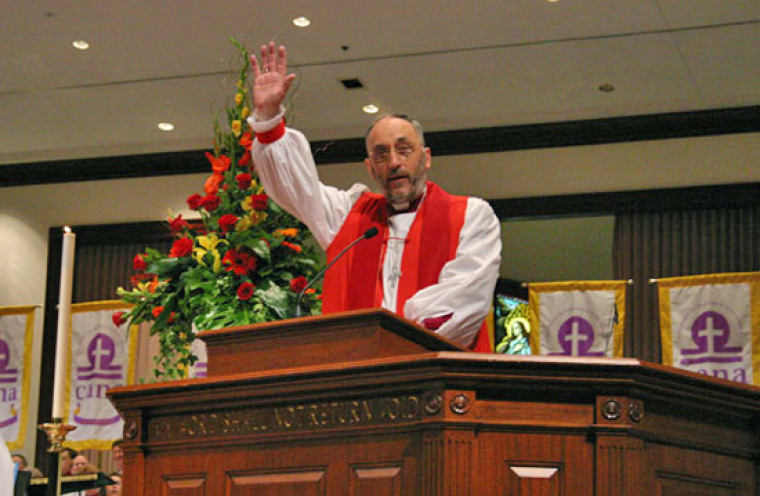
The recent non-invitation of two wayward bishops to a decennial global Anglican meeting produced a media frenzy this week. But what does all this mean?
"First of all, it is clear that the Archbishop of Canterbury faces an impossible task – he is confronted by two irreconcilable truth claims," stated Rt. Rev. Martyn Minns, newly installed missionary bishop of CANA (Convocation of Anglicans in North America) – an orthodox Anglican splinter group and offshoot of the Church of Nigeria.
Minns was one of the bishops whose name was not included in the first batch of invitations to the Lambeth Conference (2008) that were sent out on Tuesday. He oversees some 34 congregations that have split with the Episcopal Church – the U.S. arm of Anglicanism – and placed themselves under the leadership of Archbishop Peter J. Akinola of the Church of Nigeria. The breakaway group of Anglicans had departed from the Episcopal Church because of the church body's departure from Christian orthodoxy, which was highlighted by the 2003 consecration of an openly gay bishop.
That openly gay bishop, V. Gene Robinson of New Hampshire, was also not on the Lambeth invitation list. His consecration has prompted a small but growing exodus of Anglican congregations in the United States from the national body and led conservative Anglican provinces overseas to declare their relationship with the American church as severely impaired.
To Robinson, his non-invitation is "an affront to the entire Episcopal Church," he said in a released statement. "This is not about Gene Robinson, nor the Diocese of New Hampshire. It is about the American Church and its relationship to the Communion."
While Archbishop of Canterbury Dr. Rowan Williams said he has to reserve the right to withhold invitations from "bishops whose appointment, actions or manner of life have caused exceptionally serious division or scandal within the [Anglican] Communion," Minns believes what Williams has chosen to do is to "ignore the underlying issue and elevate process over principle."
Moreover, although Williams stressed that attendance at Lambeth 2008 does not commit bishops to accepting the position of others, Minns noted in a letter on Wednesday that the planned activities of Bible study, prayer and shared reflection at the gathering "presume a shared understanding of what the Bible is, who Jesus is and what he has done for us.
"Without any such agreement how can there be a coherent gospel to present to a hurting world?"
U.S. bishops, including Episcopal Presiding Bishop Katharine Jefferts Schori, have continued to reaffirm their stance for the "full inclusion" of homosexuals. And Jefferts Schori has also questioned in past interviews Jesus Christ as the one and only way to God.
Conservative Global South Primates (Anglican leaders) have expressed staunch opposition to the theological views of Jefferts Schori and clearly indicated a deep division in the Anglican Communion when seven of them refused to break bread with the Episcopal head during the global Primates meeting in February.
With the latest non-invitation of Minns, Akinola – who had installed Minns on May 5 to oversee CANA – stated that a withholding of an invitation to a Nigerian bishop will be viewed as withholding invitation to the entire House of Bishops of the Church of Nigeria. Akinola reportedly heads the largest Anglican province in the Anglican Communion.
"Finally, we need to remember that all this confusion is simply one more phase of a global conflict for the soul of the Anglican Communion," said Minns in the letter. "It is a profoundly important battle that has eternal significance."
Meanwhile, the future for CANA is very bright, said Minns. The orthodox group has been moving forward since Minns' installation early this month with 20 prospective candidates for ordination now being considered. At the same time, the splinter congregations have begun this week their court battle – which Minns predicts will be a long and costly one – with the Diocese of Virginia and the Episcopal Church over church properties.